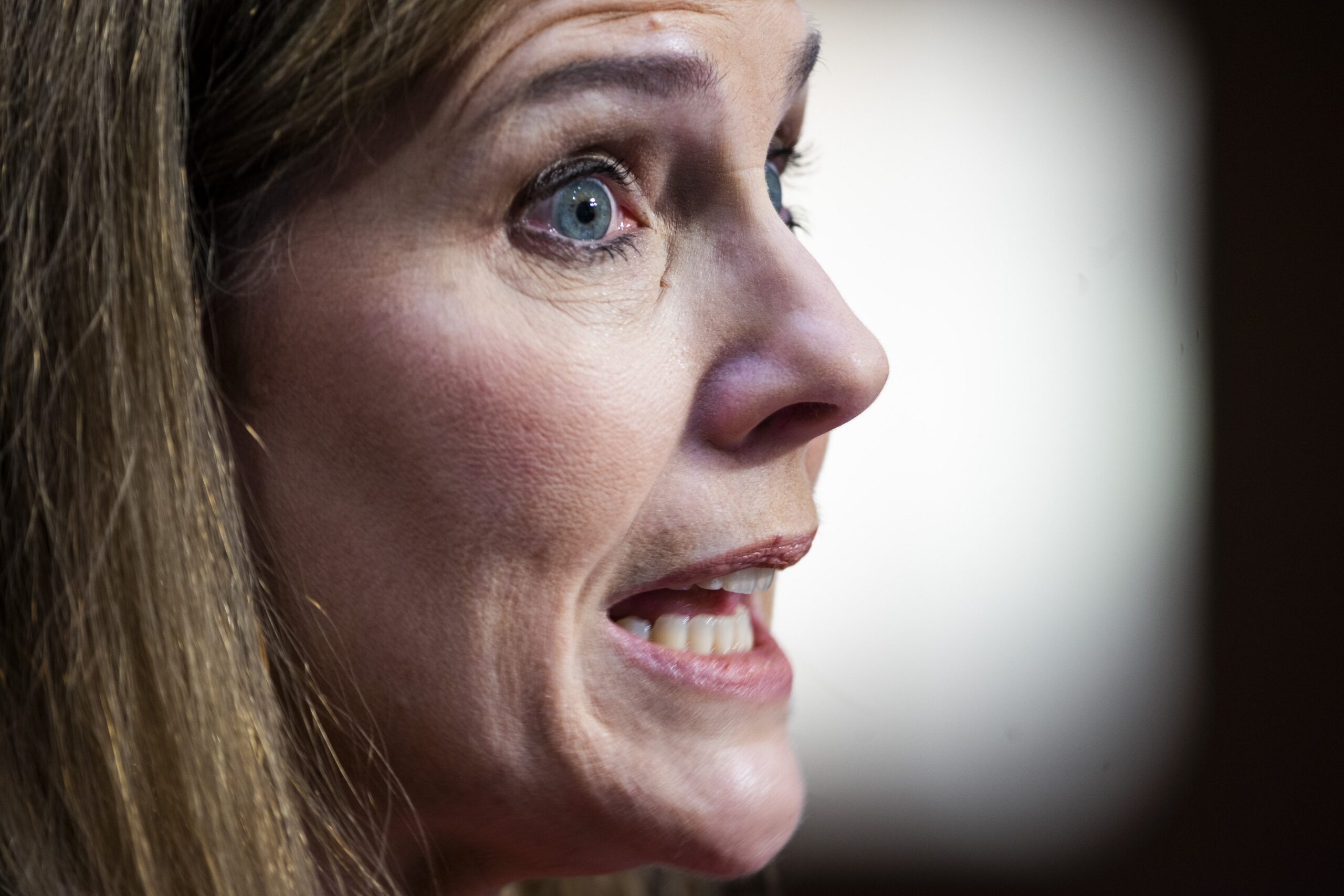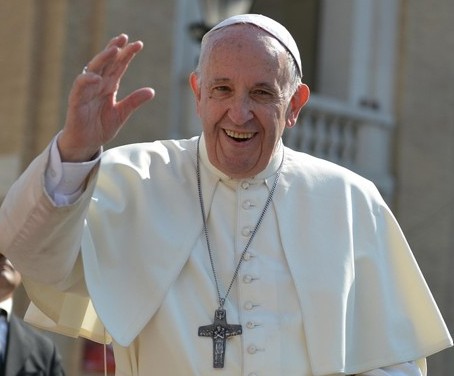CULTURE
Amy Coney Barrett Isn’t a “Handmaid’s Tale” Character—She’s Worse
09 Oct, 20

Amy Coney Barrett
Photo by Jim Lo Scalzo/UPI/Shutterstock
Amidst the political chaos of the past few weeks—the unveiling of Trump’s unpaid tax returns, a disastrous debate, Trump’s COVID-19 diagnosis, and so many other issues—Amy Coney Barrett’s Supreme Court nomination has received little significant blowback for such a significant event.
Following Ruth Bader Ginsburg’s death, many feared the worst and felt a sense of hopelessness. Ginsburg was long a pillar of women’s rights and liberty and justice for all.
Amy Coney Barrett is a staunch pro-life conservative, a member of a fringe religious group known as the People of Praise, and a former student of Antonin Scalia. Her appointment is also a specific and purposeful attack on Ginsburg’s legacy. In 2018, Trump considered picking Barrett but allegedly said “I’m saving her for Ginsburg,” according to an Axios report. Barrett received word of her nomination three days after Ginsburg’s death.
Barrett is the polar opposite of everything that Ginsburg stood for, the crystallization of what many people feared when the news of Ginsburg’s passing broke.
With Barrett on the court, there would be 6 Republicans against 3 lone Democrats—a shocking percentage, especially in a nation where Democrats won the most recent popular vote and the previous two elections.
In addition, Barrett’s rapid-fire nomination is largely thanks to the efforts of Senate Majority Leader Mitch McConnell, who—hypocritically, absurdly—blocked the Obama administration’s efforts to nominate a new Supreme Court justice in its last months, but is rushing to elect Barrett. At no time in the Senate’s history has a new Supreme Court justice been confirmed so close to an election.
Notably, McConnell was elected in his own state with a mere 37% of the vote, and Kentucky has one of the highest records of voter suppression in the country.
Joe Biden has called Barrett’s nomination an “abuse of power.” It is.
Amy Coney Barrett’s Political Record: Pro-Corporation and Anti-Worker
Barrett’s record is staunchly conservative; and, if elected, her views on issues like abortion, gay rights, and the environment would influence American life for generations to come. The Hill calls her the “most far-right Supreme Court nominee since Robert Bork was rejected in 1987.”
She is generally understood to be an originalist, someone who interprets the Constitution exactly as it was written in the 1700s (you know, back when women couldn’t vote, let alone be on the Supreme Court.
Barrett believes life begins at conception. In 2006, Barrett signed a letter that called Roe V. Wade “barbaric.” Her candidacy could mean that millions of women could go without access to birth control and safe abortions—not including the wealthy women who are able to afford safe, covert abortions—resulting in the bloody horrors of 1960s coathanger abortions and other issues that we should be long past.
She is staunchly anti-immigrant and has supported one of Trump’s policies that would block green card applicants from applying for public assistance. She also opposes the Affordable Care Act and supports the right of felons to bear arms.
Not much is known about her environmental policies, but assuming she follows the Republican tradition of climate denial, her presence could block federal caps on fossil fuel emissions, as well as other programs that are vital to ensuring a future without the consequences of climate change. A future of Amy Coney Barrett and climate deniers’ devising would be one of constant and brutal hurricanes, wildfires, and floods, which we are already seeing ravage the nation.
She is also staunchly pro-corporation and anti-worker. In 2017, she voted not to re-hear U.S. Equal Employment Opportunity Commission v. Autozone, favoring a company that had segregated its stores on the basis of race. She also recently ruled that GrubHub workers could not file class action lawsuits against their employers.
The COVID-19 Super-Spreader Event Highlights Amy Coney Barrett’s (and Trump’s) Poor Judgment
Barrett is also at the center of the story that is currently dominating the news. COVID-19 is ripping through the Trump administration, and it likely spread at Barrett’s White House confirmation celebration—an event where dozens of Trump players gathered indoors, stood close together, and did not wear masks.
Barrett and appointee Donald Trump’s poor judgment regarding this ceremony, which has resulted in COVID-19’s rampant spread and has turned the White House into a temporary ghost town, is a foreboding threat about what poor judgments she might make as a sitting member of the Supreme Court.
The pictures are disturbing to look at today, knowing that many of the poised group of mostly white politicians were infected with a dangerously infectious disease at the times they were taken. But it’s even more concerning to think of what might happen to our nation if people like Amy Coney Barrett are left to make decisions about how to handle infectious diseases, climate change, and the like.
Is Amy Coney Barrett Going to Make The Handmaid’s Tale a Reality?
One aspect of Barrett’s story has proven particularly fascinating for people on all sides of the political spectrum. Barrett is a member of the People of Praise, a fringe extremist religious Christian group that, among other things, believes that women should be subservient to their husbands, and used to refer to female members as “handmaids” and men as “heads.”
This word drew immediate comparisons in the news and on social media to The Handmaid’s Tale, Margaret Atwood’s novel that tells the story of a woman trapped in a repressive society that treats fertile women like cattle to be bread and executed as well.
But Barrett is not a character from The Handmaid’s Tale—though she sure seems like one, as many news outlets and Internet commentators have pointed out. She most immediately draws comparisons to Serena Joy, the wife of the primary commander who owns the book’s main character. Serena Joy helped to shape Atwood’s Republic, but once the republic was in place, she was relegated to the position of submissive, mostly helpless wife.
Others have argued that Barrett resembles other aspects of Atwood’s novel, a prescient text since Trump’s election.”To run with the Handmaid’s Tale analogy, Barrett isn’t a Handmaid—she’s more of an Aunt, a woman who is not only perfectly happy to use her position of power to enforce patriarchal norms and ideals but who can, by very dint of her femininity, give it a conservative feminist gloss,” writes Esther Wang.
Unfortunately, Barrett is worse than any character in The Handmaid’s Tale–because she is real, and the book is fiction. Any comparison to the book fails to encapsulate the scale of fear that Americans should feel if Barrett is appointed to the highest court of the land.
Yet, if The Handmaid’s Tale teaches us one thing, it’s that even seemingly powerful societies can and will collapse if certain fringe groups take enough power and bend enough public opinion to their will.
With Trump openly threatening not to accept election results, we cannot rule out the possibility of a Republican coup. But even if Joe Biden wins, if Amy Coney Barrett is appointed, it will already have been a sort of coup—one that undoes the legacy of one of the greatest defenders of justice of our time and damages the lives of countless people for years into the future and centuries to come.
Still, at least if Biden wins he will have some power to undo the damage that Barrett will unleash, so it is of course vital to vote and to fight to flip the Senate.
- Why Donald Trump Is (Maybe) Lying About Having COVID – Popdust ›
- Netflix Has Just Been Indicted in the “Cuties” Culture War – Popdust ›












